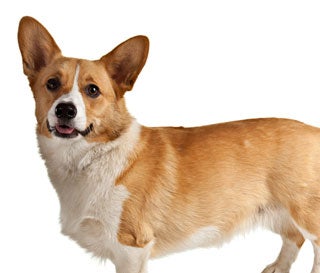Learn about dog breeds
Detailed information & photos on over 190 different breeds
Description
The Pembroke Welsh Corgi is a sturdy, short dog with powerful legs, a long body and a low profile. He is not a small dog, but is rather low to the ground but very square and solid. He carries his head high and his ears a usually pricked up. He has round eyes with black rims, a wedge-shaped head, and a tapering muzzle. The dog has a strong deep chest and firm shoulders. The Pembroke Welsh Corgi has a short stumpy tail, but otherwise resembles the Cardigan Welsh Corgi. Despite their low level of height the Pembroke Welsh Corgi is very agile. He has a thick, water resistant coat and can have white markings on a solid colored body. The coat is medium length and generally clean.
Coat Description
The Pembroke Welsh Corgi has a thick coat with medium length hair. The outer coat of the double coat is coarse, while the inner coat is fine and thick. The dog’s skin creates oils to make the fur water resistant. The breed is clean because of this, and will need some grooming but not much.
The Pembroke Welsh Corgi can have a coat of black, tan, sable, red, or fawn. Some have coats with white markings.
History
Both the Pembroke Welsh Corgi and the Cardigan Welsh Corgi originated from the same dog, the Swedish Valhund, which was introduced to Wales in the ninth century. The original Pembroke Welsh Corgi breed was brought to Pembrokeshire in the twelfth century. It was cross bred with both the descendants of the Swedish Valhund and with Pomeranians. Until the early twentieth century, the Pembroke Welsh Corgi and the Cardigan Welsh Corgi were considered the same breed. The Pembroke Welsh Corgi gained popularity when Queen Elizabeth II of England began keeping the breed. The dog was originally used for hunting, but is now considered a companion animal.
Temperament
Pembroke Welsh Corgis are described as having a happy personality, very loyal to their masters, and very tough. They can handle being around children who are careful not to pester them, and will even withstand some rough play. They were bred to herd livestock, so they can be a little domineering at times. Proper training will prevent this from becoming a problem. Firm, consistent obedience training is the best way to address behavior problems. The dogs are good problems solvers, but as herders, they also have a stubborn and independent streak. Training techniques should not be repetitive but change frequently to prevent the dog from getting bored. They are natural watchdogs and will bark at strangers and distrust people they do not know, so early socialization is a must. If socialized early, these dogs are good companion animals for other family pets.
Health Problems
One of the major problems with the Pembroke Welsh Corgi – as is prevalent with all long bodied purebred dogs – is intervertebral disc disease, which is a back problem. Progressive retinal atrophy and glaucoma are some of the eye problems the dog might encounter. Von Willebrand’s Disease and epilepsy are also common in the Pembroke Welsh Corgi.
Grooming
The Pembroke Welsh Corgi has a medium length coat that is fairly easy to maintain. He is generally clean, too. He has shedding seasons in the spring and summer, so weekly brushing with a wire brush will help this immensely. Be sure to brush both the outer and under coat to keep tangles at bay. The Pembroke Welsh Corgi has naturally water resistant fur, so he does not need to be bathed regularly. If you must bathe him, use specially formulated shampoos with the correct skin and hair pH. Rinse the dog completely after a shampoo. Check the dog’s ears to be sure they are clean. He should have his teeth cleaned regularly, and should have them brushed at home regularly as well.
Exercise
Exercise is extremely important for the Pembroke Welsh Corgi. He can develop back problems because of his long body, so he needs to be kept at a healthy weight. Obesity will make any back problems worse. He should not jump to prevent back injuries. He is an active dog, anyway, and loves to play and run. He needs regular exercise and really requires access to a backyard. Children are a good playmate for the Pembroke Welsh Corgi, as they will run and play games with him. Tug of war, hide and seek, and chase games are especially popular with the breed. They also like to walk, hike, and job with their masters. If he is properly socialized from a young age, he can go to a dog park and be on a leash around other dogs.
Training
Pembroke Welsh Corgis are smart animals and they learn quickly,. They need firm training methods and consistent training sessions to maintain good behavior and skills. They should not be subjected to harsh or negative training methods, however. They do not respond to repetitive trained because they get bored easily. They need to be taught not to bark at strangers. Socialization and obedience training can help this problem. The breed won’t probably respond to commands from strangers, but once trained they will respond from commands from all family members. They are good obedience and show dogs once they have been properly trained. They are natural herders, so herding trails are a good competition for the breed.
Advertise | Privacy Policy | Terms of Use | Contact Us © Copyright 2004-2024 PupCity.com. All rights reserved.
